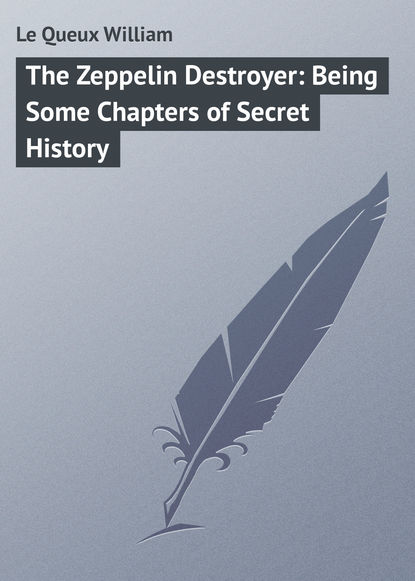
Полная версия
As We Forgive Them

Le Queux William
As We Forgive Them
Preface
From the Author to the Reader
In these modern times of breathless hurry and great combines, when birth counts for nothing; when fortunes are made in a day and credit Is lost in an hour, men’s secrets are sometimes very strange ones. It is one of these which I have here revealed; one that will, I anticipate, both startle and puzzle the reader. The mystery is, in fact, one taken from the daily life about us, the truth concerning it having hitherto been regarded as strictly confidential by the persons herein mentioned, although I am now permitted by them to make the remarkable circumstances public.
William Le Queux.Lastra a Signa, Florence.Chapter One
The Stranger in Manchester
“Dead! And he’s carried his secret with him to his grave!”
“Never!”
“But he has. Look! His jaw has dropped. Can’t you see the change, man!”
“Then he’s carried out his threat after all!”
“By Heaven, he has! We’ve been fools, Reggie – utter idiots!” I whispered.
“So it seems. I confess that I fully expected he’d tell us the truth when he knew that the end had really come.”
“Ah! you didn’t know him as I did,” I remarked bitterly. “He had a will of iron and a nerve of steel.”
“Combined with the constitution of a horse, or he’d been dead long ago. But we’ve been outwitted – cleanly outwitted by a dying man. He defied us, laughed at our ignorance to the very last.”
“Blair was no fool. He knew what knowledge of the truth meant to us – a huge fortune. So he simply kept his secret.”
“And left us in penniless chagrin. Well, although we’ve lost thousands, Gilbert, I can’t help admiring his dogged determination. He went through a lot, recollect, and he’s been a good friend to us – very good – so I suppose we really oughtn’t to abuse him, however much we regret that he didn’t let us into his secret.”
“Ah, if only those white lips could speak! One word, and we’d both be rich men,” I said in regret, gazing upon the dead, white face, with its closed eyes and closely clipped beard, lying there upon the pillow.
“He intended to hold his secret from the very first,” remarked my tall friend, Reginald Seton, folding his arms as he stood on the opposite side of the bed. “It isn’t given to every man to make such a discovery as he made. It took him years to solve the problem, whatever it was; but that he really succeeded in doing so we can’t for a moment doubt.”
“And his profit was over a million sterling,” I remarked.
“More like two, at the very lowest estimate. Recollect how, when we first knew him, he was in dire want of a sovereign – and now? Why, only last week he gave twenty thousand to the Hospital Fund. And all as the result of solving the enigma which for so long we have tried to discover in vain. No, Gilbert, he hasn’t played the square game by us. We assisted him, put him on his legs, and all that, and instead of revealing to us the key to the secret which he discovered, and which placed him among the wealthiest men of London, he point-blank refused, even though he knew that he must die. We lent him money in the old days, financed him, kept Mab at school when he had no funds, and – ”
“And he repaid us every penny – with interest,” I interposed. “Come; don’t let’s discuss him here. The secret is lost for ever, that’s enough.” And I drew the sheet over the poor dead face – the countenance of Burton Blair, the man who, during the past five years, had been one of London’s mysteries.
A strange, adventurous life, a career more remarkable, perhaps, than half those imagined by writers of romance, had been brought abruptly to an end, while the secret of the source of his enormous wealth – the secret which we both had for the past five years longed to share, because we were in a sense justly entitled to participate in its advantages – had gone with him to that bourne whence none return.
The apartment in which we stood was a small, rather well-furnished bedroom in the Queen’s Hotel, Manchester. The window looked out upon the dark façade of the Infirmary, while to that chamber of the dead there came the roar and bustle of the traffic and trams in Piccadilly. His story was assuredly one of the strangest that any man has ever told. Its mystery, as will be seen, was absolutely bewildering.
The light of the cheerless February afternoon was quickly fading, and as we turned softly to descend and inform the hotel manager of the fatal termination of the seizure, I noticed that the dead man’s suit-case stood in the corner, and that his keys were still in it.
“We had better take possession of these,” I remarked, locking the bag and transferring the small bunch to my pocket. “His executors will want them.”
Then we closed the door behind us, and going to the office imparted the unwelcome intelligence that a death had occurred in the hotel. The manager was, however, quite prepared to learn such news, for, half an hour before, the doctor had declared that the stranger could not live. His case had been hopeless from the very first.
Briefly, the facts were as follows. Burton Blair had bidden his daughter Mabel farewell, left his house in Grosvenor Square on the previous morning, and had taken the ten-thirty express from Euston to Manchester, where he had said he had some private business to transact. Just before the train arrived at Crewe, he suddenly became unwell, and was discovered by one of the luncheon-car attendants in a state of collapse in one of the first-class compartments. Brandy and restoratives being administered, he revived sufficiently to travel on to Manchester, being assisted out of the train at London Road, and two porters had helped him into a cab and accompanied him to the hotel, where, on being put to bed, he again lapsed into unconsciousness. A doctor was called, but he could not diagnose the ailment, except that the patient’s heart was seriously affected and, that being so, a fatal termination of the seizure might ensue. Towards two o’clock next morning, Blair, who had neither given his name nor told the hotel people who he was, asked that both Seton and I should be telegraphed for, and the result was that in anxious surprise we had both travelled up to Manchester, where on arrival, an hour before, we had discovered our friend to be in an utterly hopeless condition.
On entering the room we found the doctor, a young and rather pleasant man named Glenn, in attendance. Blair was conscious, and listened to the medical opinion without flinching. Indeed, he seemed rather to welcome death than to dread it, for, when he heard that he was in such a very critical condition, a faint smile crossed his pale, drawn features, and he remarked —
“Every man must die, so it may as well be to-day as to-morrow.” Then, turning to me, he added, “Gilbert, you are very good to come just to say good-bye,” and he put out his thin cold hand and grasped mine, while his eyes fixed upon me with that strange, intent look that only comes into a man’s gaze when he is on the brink of the grave.
“It is a friend’s duty, Burton,” I answered, deeply in earnest. “But you must still hope. Doctors are often mistaken. Why, you’ve a splendid constitution, haven’t you?”
“Hardly ever had a day’s illness since I was a kid,” was the millionaire’s reply in a low, weak voice; “but this fit has bowled me completely over.”
We endeavoured to ascertain exactly how he was seized, but neither Reggie not the doctor could gather anything tangible.
“I became faint all of a sudden, and I know nothing more,” was all the dying man would reply. “But,” he added, turning again to me, “don’t tell Mab till it’s all over. Poor girl! My only regret is to leave her. You two fellows were so very good to her back in the old days, you won’t abandon her now, will you?” he implored, speaking slowly and with very great difficulty, tears standing in his eyes.
“Certainly not, old chap,” was my answer. “If left alone she’ll want some one to advise her and to look after her interests.”
“The scoundrelly lawyer chaps will do that,” he snapped, with a strange hardness in his voice, as though he entertained no love for his solicitors. “No, I want you to see that no man marries her for her money – you understand? Dozens of fellows are after her at this moment, I know, but I’d rather see her dead than she should marry one of them. She must marry for love – love, you hear? Promise me, Gilbert, that that you’ll look after her, won’t you?”
Still holding his hand, I promised.
That was the last word he uttered. His pale lips twitched again, but no sound came from them. His glassy eyes were fixed upon me with a stony, terrible stare, as though he were endeavouring to tell me something.
Perhaps he was revealing to me the great secret – the secret of how he had solved the mystery of fortune and become worth over a million sterling – perhaps he was speaking of Mab. Which we knew not. His tongue refused to articulate, the silence of death was upon him.
Thus he passed away; and thus did I find myself bound to a promise which I intended to fulfil, even though he had not revealed to us his secret, as we confidently expected. We believed that, knowing himself to be dying, he had summoned us there to impart that knowledge which would render us both rich beyond the dreams of avarice. But in this we had been most bitterly disappointed. For five years, I confess, we had waited, expecting that he would some day share some of his wealth with us in return for those services we had rendered him in the past. Yet now it seemed he had coolly disregarded his indebtedness to us, and at the same time imposed upon me a duty by no means easy – the guardianship of his only daughter Mabel.
Chapter Two
Contains Certain Mysterious Facts
I ought here to declare that, having regard to all the curious and mysterious circumstances of the past, the situation was, to me, far from satisfactory. As we strolled together along Market Street that cold night discussing the affair, rather than remain in the public room of the hotel, Reggie suggested that the secret might be written somewhere and sealed up among the dead man’s effects. But in that case, unless it were addressed to us, it would be opened by the persons the dying man had designated as “those scoundrelly lawyer chaps,” and in all probability be turned by them to profitable account.
His solicitors were, we knew, Messrs Leighton, Brown and Leighton, an eminently respectable firm in Bedford Row; therefore we sent a telegram from the Central Office informing them of their client’s sudden death, and requesting that one of the firm should at once come to Manchester to attend the inquest which Doctor Glenn had declared would be necessary. As the deceased man had expressed a wish that Mabel should, for the present, remain in ignorance, we did not inform her of the tragic occurrence.
Curiosity prompted us to ascend again to the dead man’s chamber and examine the contents of his kit-bag and suit-case, but, beyond his clothes, a cheque-book and about ten pounds in gold, we found nothing. I think that we both half-expected to discover the key to that remarkable secret which he had somehow obtained, yet it was hardly to be imagined that he would carry such a valuable asset about with him in his luggage.
In the pocket of a small writing-book which formed part of the fittings of the suit-case I discovered several letters, all of which I examined and found them to be of no importance – save one, a dirty, ill-written note in uneducated Italian, which contained some passages which struck me as curious.
Indeed, so strange was the tenor of the whole communication that, with Reggie’s connivance, I resolved to take possession of it and make further inquiry.
There were many things about Burton Blair that had puzzled us for years, therefore we were both determined, if possible, to elucidate the curious mystery that had surrounded him, even if he had carried to his grave the secret of his enormous fortune.
We alone in all the world knew the existence of the secret, only we were in ignorance of the necessary key by which the source of riches could be opened. The manner in which he had gained his great wealth was a mystery to every one, even to his daughter Mabel. In the City and in Society he was vaguely believed by some to possess large interests in mines, and to be a successful speculator in stocks, while others declared that he was the ground-landlord of at least two large cities in America, and yet others were positive that certain concessions from the Ottoman Government had brought him his gold.
All were, however, mistaken in their surmises. Burton Blair possessed not an acre of land; he had not a shilling in any public company; he was not interested in either Government concessions or industrial enterprises. No. The source of the great wealth by which he had, in five years, been able to purchase, decorate and furnish in princely manner one of the finest houses in Grosvenor Square, keep three of the most expensive Panhards, motoring being his hobby, and rent that fine old Jacobean mansion Mayvill Court, in Herefordshire, came from a source which nobody knew or even suspected. His were mysterious millions.
“I wonder if anything will come out at the inquest?” queried Reggie, later that evening. “His lawyers undoubtedly know nothing.”
“He may have left some paper which reveals the truth,” I answered. “Men who are silent in life often commit their secrets to paper.”
“I don’t think Burton ever did.”
“He may have done so for Mabel’s benefit, remember.”
“Ah! by Jove!” gasped my friend, “I never thought of that. If he wished to provide for her, he would leave his secret with some one whom he could implicitly trust. Yet he trusted us – up to a certain point. We are the only ones who have any real knowledge of the state of affairs,” and my tall, long-legged, fair-haired friend, who stood six feet in his stockings, the picture of the easy-going muscular Englishman, although engaged in the commerce of feminine frippery, stopped with a low grunt of dissatisfaction, and carefully lit a fresh cigar.
We passed a dismal evening strolling about the main streets of Manchester, feeling that in Burton Blair we had lost a friend, but when on the following morning we met Herbert Leighton, the solicitor, in the hall of the Queen’s, and had a long consultation with him, the mystery surrounding the dead man became considerably heightened.
“You both knew my late client very well, indeed,” the solicitor remarked, after some preliminaries. “Now, are you aware of the existence of any one who would profit by his sudden decease?”
“That’s a curious question,” I remarked. “Why?”
“Well, the fact is this,” explained the dark, sharp-featured man, with some hesitation. “I have every reason to believe that he has been the victim of foul play.”
“Foul play!” I gasped. “You surely don’t think that he was murdered? Why, my dear fellow, that couldn’t be. He was taken ill in the train, and died in bed in our presence.”
The solicitor, whose face had now become graver, merely shrugged his narrow shoulders, and said – “We must, of course, await the result of the inquest, but from information in my possession I feel confident that Burton Blair did not die a natural death.”
That same evening the Coroner held his inquiry in a private room in the hotel, and, according to the two doctors who had made the post-mortem earlier in the day, death was due entirely to natural causes. It was discovered that Blair had naturally a weak heart, and that the fatal termination had been accelerated by the oscillation of the train.
There was absolutely nothing whatever to induce any suspicion of foul play, therefore the jury returned a verdict in accordance with the medical evidence that death was due to natural causes, and an order was given for the removal of the body to London for burial.
An hour after the inquest I took Mr Leighton aside and said —
“As you know, I have for some years been one of the late Mr Blair’s most intimate friends, and, therefore, I am naturally very much interested to know what induced you to suspect foul play.”
“My suspicions were well based,” was his rather enigmatical answer.
“Upon what?”
“Upon the fact that my client himself had been threatened, and that, although he told no one and laughed at my suggested precautions, he has lived in daily dread of assassination.”
“Curious!” I ejaculated. “Very curious!”
I told him nothing of that remarkable letter I had secured from the dead man’s luggage. If what he said were really true, then there was a very extraordinary secret in the death of Burton Blair, equally with that of his strange, romantic and mysterious life – a secret that was inscrutable, yet absolutely unique.
It will be necessary, I think, to fully explain the curious circumstances which first brought us into contact with Burton Blair, and to describe the mysterious events which followed our acquaintanceship. From beginning to end the whole affair is so remarkable that many who read this record of facts may be inclined to doubt my veracity. To such, I would at the very outset suggest that they make inquiries in London, in that little world of adventurers, speculators, money-lenders and money-losers known as “the City,” where I feel sure they will have no difficulty in learning even further interesting details regarding the man of mysterious millions whom this narrative partially concerns.
And certainly the true facts concerning him will, I do not hesitate to say, be found to form one of the most remarkable romances in modern life.
Chapter Three
In Which a Strange Story is Told
In order to put the plain, unvarnished truth before you, I must, in the first place, explain that I, Gilbert Greenwood, was a man of small means, having been left an annuity by an ascetic Baptist, but somewhat prosperous aunt, while Reginald Seton I had known ever since we had been lads together at Charterhouse. The son of George Seton, a lace warehouseman of Cannon Street and Alderman of the City of London, Reggie had been left at twenty-five with a heavy burden of debt and an old-fashioned, high-class but rapidly declining business. Still, brought up to the lace trade in a factory at Nottingham, Reggie boldly followed in his father’s footsteps, and by dint of close attention to business succeeding in rubbing along sufficiently well to avoid the bankruptcy court, and to secure an income of a few hundreds a year.
Both of us were still bachelors, and we chummed in comfortable chambers in a newly-constructed block of flats in Great Russell Street, while, being also fond of fox-hunting, the only sport we could afford, we also rented a cheap, old-fashioned house in a rural village called Helpstone, eighty miles from London, in the Fitzwilliam country. Here we spent each winter, usually being “out” two days a week.
Neither of us being well off, we had, as may be imagined, to practise a good deal of economy, for fox-hunting is an expensive sport to the poor man. Nevertheless, we were both fortunate in possessing a couple of good horses apiece, and by dint of a little squeezing here and there, were able to indulge in those exhilarating runs across country which cause the blood to tingle with excitement, and rejuvenate all who take part in them.
Reggie was sometimes kept in town by the exigencies of his deal in torchon, Maltese and Honiton, therefore I frequently lived alone in the old-fashioned, ivy-covered house, with Glave, my man, to look after me.
One bitterly cold evening in January Reggie was absent in London, and I, having been hunting all day, was riding home utterly fagged out. The meet that morning had been at Kate’s Cabin, over in Huntingdonshire, and after two good runs I had found myself beyond Stilton, eighteen miles from home. Still, the scent had been excellent, and we had had good sport, therefore I took a pull at my flask and rode forward across country in the gathering gloom.
Fortunately I found the river fordable at Water Newton mill, a fact which saved me the long détour by Wansford, and then when within a mile of home I allowed my horse to walk, as I always did, in order that he might cool down before going to his stable. The dusk of the short afternoon was just deepening into night, and the biting wind cut me like a knife as I passed the crossroads about half a mile from Helpstone village, jogging along steadily, when of a sudden a man’s burly figure loomed out of the shadow of the high, holly hedge, and a deep voice exclaimed —
“Pardon me, sir, but I’m a stranger in these parts, and my daughter here has fainted. Is there a house near?”
Then, as I drew near, I saw huddled upon a heap of stones at the roadside the slim, fragile form of a young girl of about sixteen, wrapped in a thick, dark-coloured cloak, while in the glimmer of light that remained I distinguished that the man who was addressing me was a bluff, rather well-spoken, dark-bearded fellow of about forty-five or so, in a frayed suit of blue serge and peaked cap that gave him something of the appearance of a seafarer. His face was seamed and weatherbeaten, and his broad, powerful jaws betokened a strength of character and dogged determination.
“Has your daughter been taken ill?” I inquired, when I had thoroughly examined him.
“Well, the fact is we’ve walked a long way to-day, and I think she’s done up. She became dazed like about half an hour ago, and when she sat down she fell insensible.”
“She mustn’t stay here,” I remarked, as the fact became plain that both father and daughter were tramps. “She’ll get frozen to death. My house is over yonder. I’ll ride on and bring back some one to help carry her.”
The man commenced to thank me, but I touched my horse with the spur, and was soon in the stableyard calling for Glave to accompany me back to the spot where I had left the wayfarers.
A quarter of an hour later we had arranged the insensible girl on a couch in my warm, snug sitting-room, had forced some brandy down her throat, and she had opened her eyes wonderingly, and looked round with childlike temerity upon her unfamiliar surroundings.
Her gaze met mine, and I saw that her countenance was undeniably beautiful, of that dark, half-tragic type, her eyes rendered the more luminous by the deathlike pallor of her countenance. The features were well-moulded, refined and handsome in every line, and as she addressed her father, inquiring what had occurred, I detected that she was no mere waif of the highway, but, on the contrary, highly intelligent, well mannered and well educated.
Her father, in a few deep words, explained our abrupt meeting and my hospitality, whereupon she smiled upon me sweetly and uttered words of thanks.
“It must have been the intense cold, I think,” she added. “Somehow I felt benumbed all at once, and my head swam so that I couldn’t stand. But it is really very kind indeed of you. I’m so sorry that we’ve disturbed you like this.”
I assured her that my only wish was for her complete recovery, and as I spoke I could not conceal from myself that her beauty was very remarkable. Although young, and her figure as yet not fully developed, her face was nevertheless one of the most perfect I had ever seen. From the first moment my eyes fell upon her, I found her indescribably charming. That she was utterly exhausted was rendered plain by the painful, uneasy manner in which she moved upon her couch. Her rusty black skirt and thick boots were muddy and travel-stained, and by the manner she pushed the tangled mass of dark hair from her brow I knew that her head ached.
Glave, in no good mood at the introduction of tramps, entered, announcing that my dinner was ready; but she firmly, yet with sweet grace, declined my invitation to eat, saying that if I would permit her she would rather remain alone on the couch before the fire for half an hour longer. Therefore I sent her some hot soup by old Mrs Axford, our cook, while her father, having washed his hands, accompanied me to the dining-room.
He seemed half-famished, taciturn and reserved at first, but presently, when he had judged my character sufficiently, he explained that his name was Burton Blair, that in his absence abroad he had lost his wife ten years before, and that little Mab was his only child. As his appearance denoted, he had been at sea the greater part of his life and held a master’s certificate, but of late he had been living ashore.












